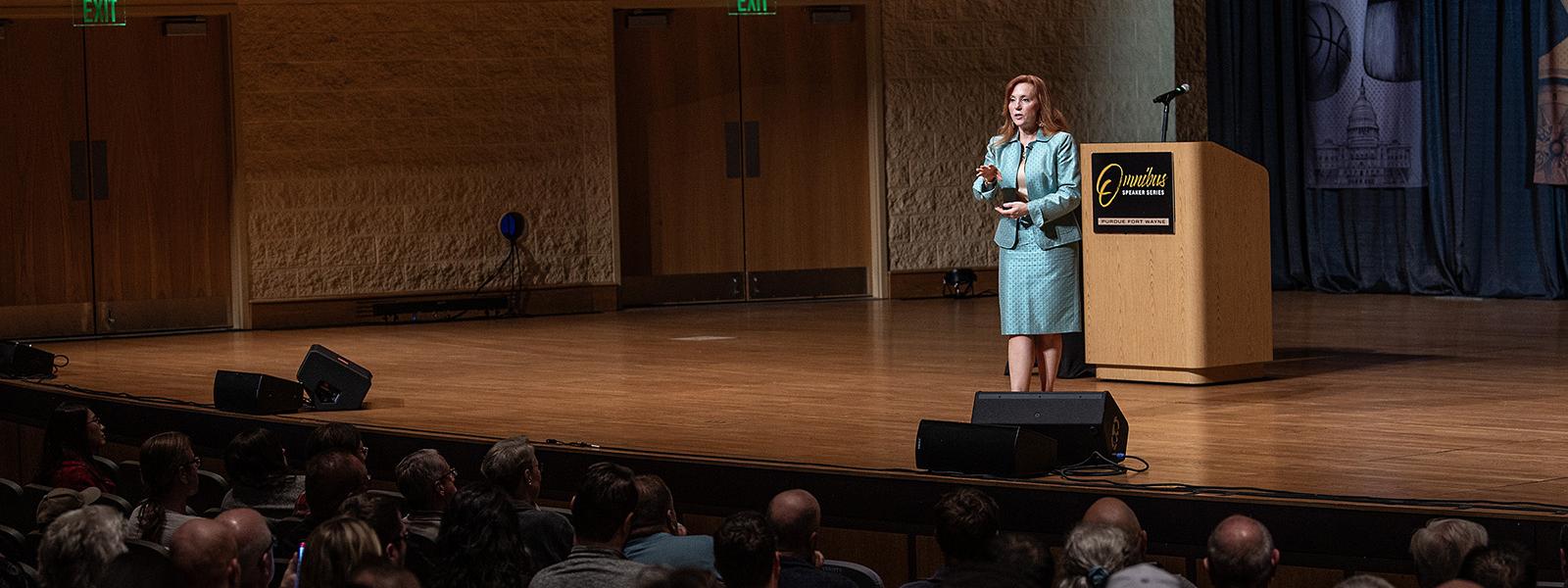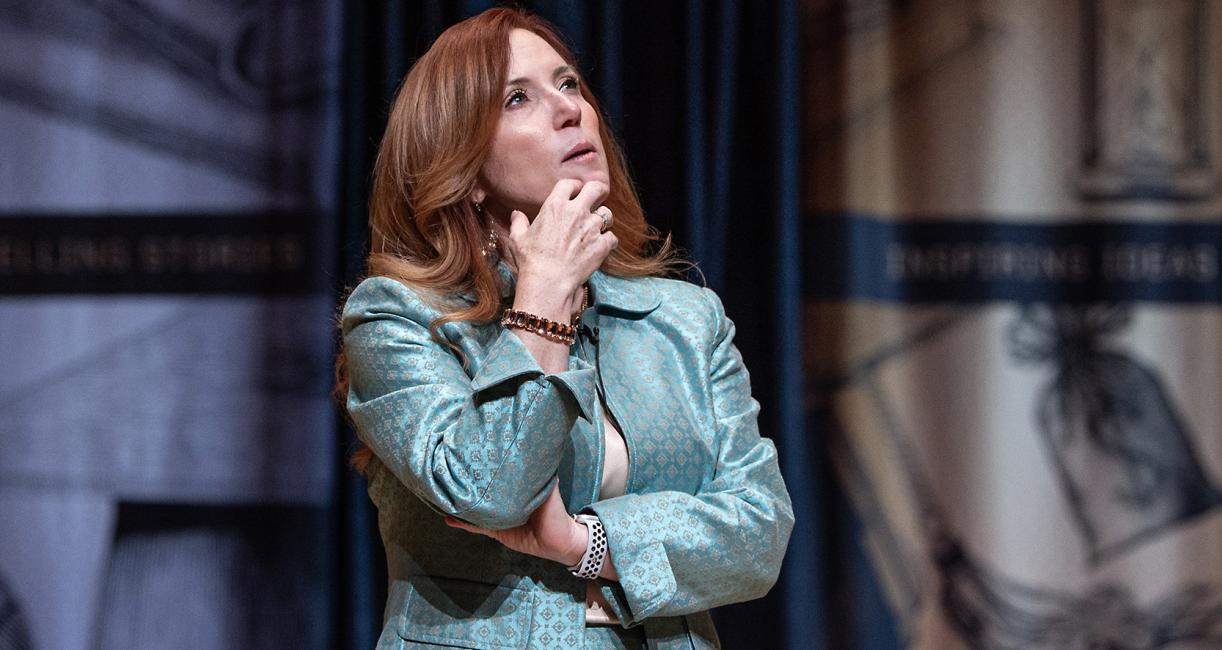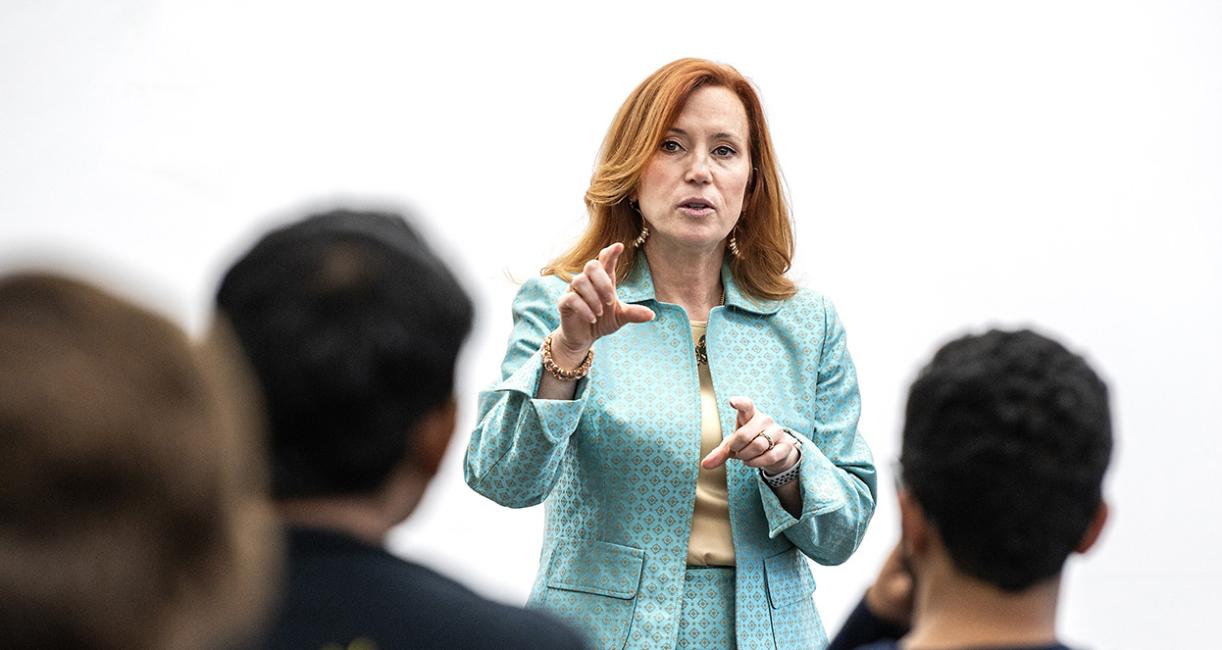



Payton offers cybersecurity advice during Omnibus presentation
By Blake Sebring
November 8, 2023
To illustrate a point during an classroom session Tuesday afternoon, technology and cybersecurity expert Theresa Payton was talking about how artificial intelligence is exploding into many parts of our existence.
“If I want to know what the weather is before I go on my run this morning, I could look up the news, or turn on the news, or ask Siri,” Payton said as an example.
Within seconds, a voice piped up from her phone sitting 10 feet away, “It is currently 54 degrees.”
Once the students stopped laughing, Payton said, “They are always listening, always listening.”
Later in the evening, Payton took her turn as the second presenter in the 2023–24 Purdue University Fort Wayne Omnibus Speaker Series at Auer Performance Hall. Most casual internet users have no idea about the predominance of artificial intelligence in their lives, but the former chief information officer in the George W. Bush White House warned her audiences about how AI helps cybercriminals. They often use tools such as voice imitation, manipulation, and misinformation to rob their victims.
Payton said 90% of Americans see a lack of privacy as an issue, and a global survey said that two-thirds of people think tech companies have too much of their data. She said if people who had experienced identity theft during 2022 lined up head-to-toe along the equator, they would circle the globe four times.
And it’s only getting worse. Artificial intelligence continues to expand exponentially throughout all parts of society, and Payton said it can now guess people’s race, location, occupation, and more about them through their postings. The more we use online services, the more information we feed into the system that criminals using AI can exploit.
Payton emphasized that AI can also protect us and that this is an incredible time to be a student studying computer science. The question they must address in the future is, “How do we protect all of this data? How can you personally be safer and protect those around you?”
During a rapid-fire Q&A session in the IDEASpace at Helmke Library, Payton answered more than 20 student questions, turning the discussion into a world-class cybersecurity seminar. She encouraged the students to follow multiple news organizations and their fact-checking services. She said she follows at least one international news organization to get a different perspective from American media.
Like the best professors, Payton made the complex material understandable, saying digital users generally need more online security but are usually reluctant to take the time and effort required to give themselves a safer online presence.
“If you want to have those roadblocks, a lot of people won’t tolerate the security required,” Payton said. “It’s by design clunky and hard.”
Those types of security measures also cut heavily into business productivity and efficiency.
During her evening presentation, Payton tried suggesting various tools people can use online and encouraged them to follow her on LinkedIn.
“No matter what technology is out here, cybercriminals are always looking for ways to get between you and security and privacy protocols,” Payton said.
One suggestion was that people set up a separate email to handle their banking and another for their healthcare communication.
There are potential positive uses for AI, Payton said, such as criminal investigations, medical consultations, and training, but at the same time, this type of technology is often being used in the wrong hands.
“There’s a lot we still need to unpack as far as making sure that this innovation, this incredible technology, works for us and on behalf of us and enhances our life while at the same time having the right guardrails to make sure it doesn’t work against us,” Payton said.
Payton said that according to FBI statistics, 98% of all attacks depend on getting people to click on a link, open an attachment, or get on the phone and talk to the wrong person.
The Omnibus Speaker Series is made possible in part due to the support of the English-Bonter-Mitchell Foundation, which has sponsored every season since the series launched in 1995.
For more information on the other 2023-24 speakers – and the series itself – visit PFW.edu/omnibus.




